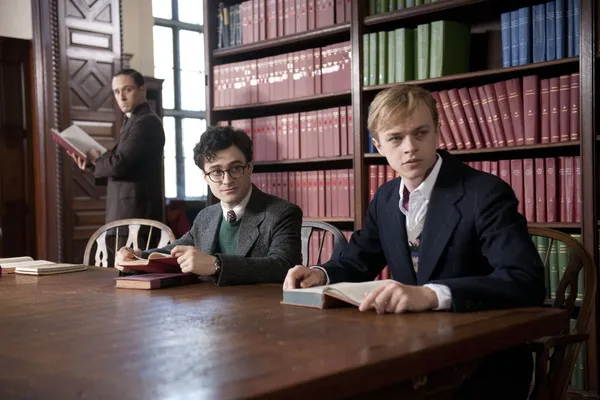Eye For Film >> Movies >> Kill Your Darlings (2013) Film Review
Kill Your Darlings
Reviewed by: David Graham

The latest in the recent flurry of patchy Beat-pics, John Krikodas’ debut is a somewhat simplistic and one-sided chronicle that fails to do justice to the tragic arc of its characters, flying in the face of generally-held beliefs to paint a peculiarly damning portrait of Kerouac, Burroughs et al. More or less functioning as a prequel to other Allen Ginsberg biopics, the publicity-stoking casting of Daniel Radcliffe hasn’t really paid off – he’s as ineffectual here as he was in The Woman In Black – while the brilliance of the authors is lost amongst their petty antics. There’s an enveloping darkness to the story, but crucial details are willingly flubbed – as they were in Howl but to less detrimental effect - leading to a manipulative and sour experience that feels as false as it does flat.
When he is accepted into New York’s prestigious Columbia University, teenage would-be writer Allen Ginsberg is overjoyed to be leaving his sedate New Jersey borough and patronising poet father, but his mentally unstable mother remains a constant concern. He finds respite from the skirt-chasing jocks in his dorm with the louche, revolutionary-minded Lucien Carr, whose literary ambitions conflict with his nocturnal debauchery. Inserting the shy but smitten Ginsberg into his group of arty associates – including the perpetually wasted Bill Burroughs and experience-advocating seaman-turned-writer Jack Kerouac – trouble soon brews when Carr’s similarly besotted gentleman friend David enters the picture, his obsession reaching dangerous levels as Allen comes to question his own relationship with his flighty beau.

Curiously for an openly gay director, Krikodas doesn’t deal very sensitively with the issues sexuality presented for these period characters, simplifying their desires down perhaps to make them more palatable to a post-Potter mainstream target audience, who surely won’t be interested in the first place. Ginsberg’s pining is portrayed as being somewhat pathetic, while Carr’s ambivalence seems to tip over into homophobia at points in ways that feel like a denial themselves (of an obviously more complex reality), the script seemingly punishing him for exploiting the others’ affections. The hypocritical matter of ’honor slayings’ (where purportedly heterosexual men argued self-defence against ‘predatory’ homosexuals) should also have led into some intriguing courtroom drama, surely the first time a film cries out for more of this staple rather than less.
It’s understandable for a debutante, but Krikodas’ style is often frustrating, falling back on out-of-focus shots to impart a clichéd substance-addled wooziness and too many sped-up montages and rewound moments to portray Ginsberg’s muse-chasing and moral uncertainty respectively. The editing smacks of someone who’s seen Requiem For A Dream too many times, while the group’s crimes against authority and their staid establishment aren’t quite as suspenseful or entertaining as they should be. It’s all too clearly the work of a first-time director, confusing energy with insight, although the trendy use of classic jazz alongside a couple of anachronistic modern hipster-rock songs is actually quite rousing in places.
Too many of the performances coast on the actors’ customary schtick: Ben Foster (typecast as Burroughs) does mumbly derangement yet again, Dane DeHaan glowers with his usual dark intensity while Radcliffe flounders in another earnest but fundamentally inappropriate role. He looks about right as the bookish Ginsberg and his accent is passable, but he never seems to scratch the surface of Ginsberg’s myriad boiling pressures, falling back on obvious facial tics and after-school emoting. Women are something of a token presence too: Jennifer Jason Leigh is impressive but under-used despite Mrs Ginsberg being such a huge part of her son’s world-view and poetry, while Elizabeth Olsen continues to plough a Maggie Gyllenhal-esque middle ground between worthy indie fare and blockbusters, neither of which do her much favour.
Perhaps most impressive is Dexter star Michael C Hall, bringing an aching pathos to Lu’s tortured admirer David, veering between jealous rage and desperate appeals in a way that makes the character more sympathetic than he probably deserves (Kammerer began grooming and stalking his ‘love’ when Carr was just 14). By failing to commit to any one character's view though, Krikodas seems uncertain how to handle Kammerer’s fate, leaving the denouement bizarrely underwhelming, and severely biased against Carr when in actual fact he was probably the victim of what today would constitute paedophilia (the end-credit titles hint at how Carr went on to be a much-respected and more humble man – friend to Kerouac to the end - than seems possible from his depiction here).
Taken as a yarn, it’s a familiar tale of teenage infatuation leading to tragedy, and as cinema, it’s a pretty bog-standard biopic. It’s watchable due to the charismatic leads and the evergreen appeal of the deeply flawed but invigorating Beat Generation movement, but Krikodas should be wary of letting his style run rampant over material that could have been both resonant and disturbing given some restraint, while Radcliffe still needs a role that plays to his strengths to advance his career as a leading man. Kill Your Darlings isn’t exactly bad, it’s just a bit boring and misguided, something Ginsberg could never be accused of.
Reviewed on: 11 Dec 2013

















